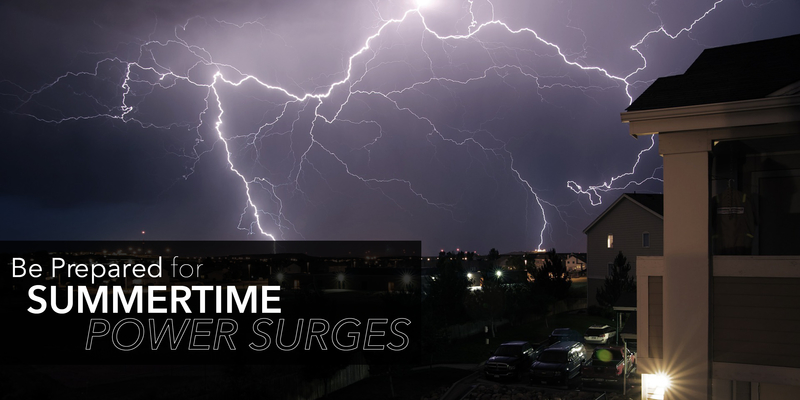Be Prepared for Summertime Power Surges

With all those air conditioners running during the summer, the electrical grid maxes out, and power surges become more common. If you’re concerned about the damage this can cause to your AC and other electronics, now’s the time to learn about and prepare for summertime power surges.
Causes of Summer Power Surges
A power surge is a sudden increase in voltage that significantly exceeds the standard 120-volt flow of electricity entering a building. Many things can cause power surges, though lightning strikes usually come to mind first. However, it’s those smaller, daily surges—not dramatic lightning strikes—that cause problems 80 percent of the time. Some of the most common causes of summer power surges include:
- Downed power lines caused by storms or auto collisions
- Over voltages from the utility company caused by fluctuating demand on the local power plant
- Mistakes made during power line maintenance
- Fluctuating demand from your home appliances
How to Protect Devices from Power Surges
A power surge can make your air conditioner stop working. The same way a lightning strike sends a jolt to the heart, a sudden surge of electricity carries thousands or tens of thousands of volts through your home’s wiring. This makes your electronics, appliances, and HVAC system vulnerable to the damaging effects of power surges. To protect these devices, follow these tips:
- Plug electricity-powered items into surge protectors: As a savvy electronics owner, you probably know to plug your computer, home entertainment equipment, and other sensitive electronics into surge protectors. Remember, there’s a difference between ordinary power strips and those that provide surge protection. Make sure the ones you use aren’t just glorified extension cords but that they’re bonafide surge protectors.
- Install whole-house surge protection: This option safeguards the wiring throughout your home against the damaging effects of power surges. It shields everything from your central air conditioner to your computer’s hard drive from externally sourced power surges. As a bonus, whole-house surge protection also provides an internal safeguard. This means your devices are protected against the sudden increase in voltage caused by your air conditioner, blow dryer, vacuum cleaner, and microwave each time they power on.
How to Reduce Your Dependence on the Electrical Grid
By limiting your power consumption, you lower the strain on the electrical grid and decrease your energy bills at the same time. To achieve this win-win situation, follow these energy-saving tips:
- Run your air conditioner less: Set the thermostat to 78 degrees and keep cool by running a fan, placing a damp towel on your neck, and dressing for the season.
- Reduce external heat gain: Close the curtains to stop the sun from shining in. If possible, plant trees on the south and west sides of your home for shade in the afternoon. Then, seal cracks around windows and doors to keep hot air out.
- Don’t heat your home from the inside: Refrain from using the oven, stove, dishwasher, or dryer during the day. Run these energy-hungry, heat-producing appliances at night when cooling demand drops and electricity rates lower.
- Take advantage of natural cooling: At night, open the windows to draw in cold air. In the morning, close the windows to trap this air inside. Then, during the day, retreat to the basement where it’s the coolest.
Prepare Now for Summertime Power Surges
Installing whole-house surge protection and plugging devices into point-of-use surge protectors are the best ways to prevent tripped breakers and a broken air conditioner. Please contact Aire Serv® to learn more about the importance of surge protection, or to schedule a repair for your air conditioner that was recently damaged by a power surge.
 Click to call
Click to call


